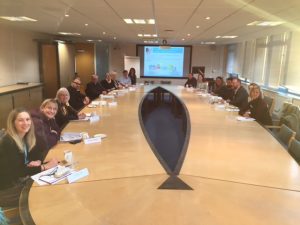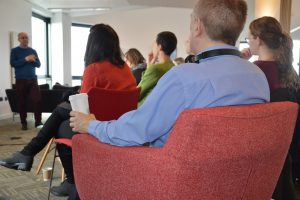Higher Education and Research Bill – the third reading of the Bill in the House of Lords was scheduled for Wednesday and was about to start when the attack took place in Westminster, so the session was cancelled. It has now been rescheduled for Tuesday 4th April. The current version of the bill as amended at the report stage is here. There is a short list of amendments for the third reading – these are usually “tidying up” amendments rather than the more substantive ones that we have seen in the earlier stages – and are monstly (but not exclusively) government amendments. The Bill will then return to the Commons – probably after Easter – when all six of the opposition and cross bench amendments made by the Lords are likely to be removed – including the one decoupling TEF ratings and fee increases, removing the Gold, Silver, Bronze TEF system and replacing it with a pass/fail, and measures aiming to support international students and staff studying and working in the UK.
There may be government amendments proposed in the Commons to seek to address some of the concerns behind the amendments to the TEF, but it seems unlikely that there will be concessions on international staff and students in the bill as these issues will be relevant to the separate consultation on immigration policy, which we are still waiting for. There will therefore inevitably be another process of “ping-pong” . If the Lords don’t accept the position approved by the Commons (and any concessions made) then there is a risk that the bill will run out of time in this session.
To respond to concerns raised by the Lords, Jo Johnson and the sponsor of the bill in the House of Lords, Viscount Younger of Leckie have written a number of letters during the report stage.
- 15th March 2017 – powers to enter and search
- 6th March 2017 – regulation (compliance with the Regulator’s Code – will require a statutory instrument but government agree), role of the Competition and Markets Authority (the government believe there is no overlap between the OfS and the CMA). One government amendment clarified that in addition to promoting competition, the OfS should have regard to the benefits of HEI collaboration for students and employers.
- 3rd March 2017 – defending the TEF and its metrics, setting out the context and background and confirming a commitment to ensuring that the TEF supports widening participation.
There has not been a response to the amendments that were passed, so we will wait to see. In the meantime, there were some interesting articles about the future for the TEF on Wonkhe on Monday:
Another concern raised by the Lords and also raised in Education questions in the Commons this week related to free speech. Jo Johnson, the universities minister, added that the bill would safeguard free speech by extending the duty to take reasonably practicable steps to secure freedom of speech to all registered providers. On the same day, Johnson also wrote to universities asking them to pay particular attention to this issue. He advised: “Policies and codes of practice should not simply be allowed to gather dust; they are crucial to demonstrating to students that free speech should be at the heart of our university system. They need to be meaningful documents that students and staff understand and, crucially, respect.”
Brexit – with the PM expected to serve formal notice to start Brexit negotiations under Article 50 next week, Peers debated EU membership and UK science after the referendum on 23 March. They urged the government to replace any money lost from EU research programmes with fresh money from Westminster, rather than with the extra £4.7 million allocated to science and innovation in the 2016 autumn statement.
The Parliamentary and Scientific committee have published a statement on science priorities for Brexit. It asks for immediate actions, sets out negotiation priorities and changes to domestic policy. It’s very short and readable – a list of proposals rather than a long summary of evidence and background
Its first statement is about staff and skills – it calls for immediate reassurance for EEA staff working in the UK, research about mobility of skilled workers to inform immigration policy and for the government to develop a communications strategy that champions Britain as a welcoming hub for research and innovation.
On funding, it says that there must be no decline in overall funding for science and innovation across all disciplines, calls for continued participation in Horizon 2020 and for the government to “set the closest possible association for the UK with EU research and innovation programmes”. It also proposes a target of 3% of GDP for combined public and private R&D investment, with at least 0.7% of GDP invested in research and development. It calls for a comprehensive review of all current public funding for UK research and development to ensure there is no gap as the UK leaves the EU.
It sets out requirements to ensure that UK-based researchers are able to collaborate, including funding and infrastructure for partnerships. On trade, it suggests that all government departments should have scientific advisers, and calls for a comprehensive review of the current regulatory environment.
Student Loans – in a written answer to a parliamentary question Jo Johnson noted that the latest Student Loans Company statistics show that there were around 113,600 English student loan borrowers known to be abroad at the beginning of the financial year 2016-17. Of these around 22 per cent were EU-domiciled borrowers. The figures also show that the overall outstanding loan balance of these borrowers resident abroad was around £1.6 billion, of which around £220 million was held by EU-domiciled borrowers. He added in a separate answer that the Student Loans Company established a repayments evasion unit in 2016 to detect borrowers who live abroad and who fail to repay their loans.
Advance marketing – along with Professor Debbie Holley, I am presenting some policy briefings and workshops – read more and book via the intranet.
 The UK Collaborative on Development Sciences (UKCDS) is a group of 14 UK government departments and research funders working in international development.
The UK Collaborative on Development Sciences (UKCDS) is a group of 14 UK government departments and research funders working in international development.







 Then come along to one of the Writing Academy’s “My publication story so far…” lunchbyte sessions.
Then come along to one of the Writing Academy’s “My publication story so far…” lunchbyte sessions.
 Yesterday, the RCUK launched reports detailing the impacts of a collective investment of £3.4Bn in 2015/16. These impact reports showcase specific examples of the impact of investment through their various awards, programmes and collaborations. The wide-ranging nature of the impact extends from furthering technological advances to combatting disease to breakthroughs in the creative economy. Click
Yesterday, the RCUK launched reports detailing the impacts of a collective investment of £3.4Bn in 2015/16. These impact reports showcase specific examples of the impact of investment through their various awards, programmes and collaborations. The wide-ranging nature of the impact extends from furthering technological advances to combatting disease to breakthroughs in the creative economy. Click 


 On Wednesday 24th May, the Writing Academy will be hosting a Lunchbyte session with Tim Rees. During the session Tim will talk about his personal publishing experience, his approaches to research and writing, his tips on developing a publication strategy and working with co-authors, reviewers and editors. He will talk about all types of publishing drawing on personal experience.
On Wednesday 24th May, the Writing Academy will be hosting a Lunchbyte session with Tim Rees. During the session Tim will talk about his personal publishing experience, his approaches to research and writing, his tips on developing a publication strategy and working with co-authors, reviewers and editors. He will talk about all types of publishing drawing on personal experience. As part of the Writing Academy, a series of writing days have been organised to help support BU authors work on their
As part of the Writing Academy, a series of writing days have been organised to help support BU authors work on their 













 REF Code of Practice consultation is open!
REF Code of Practice consultation is open! BU Leads AI-Driven Work Package in EU Horizon SUSHEAS Project
BU Leads AI-Driven Work Package in EU Horizon SUSHEAS Project Evidence Synthesis Centre open at Kathmandu University
Evidence Synthesis Centre open at Kathmandu University Expand Your Impact: Collaboration and Networking Workshops for Researchers
Expand Your Impact: Collaboration and Networking Workshops for Researchers ECR Funding Open Call: Research Culture & Community Grant – Apply now
ECR Funding Open Call: Research Culture & Community Grant – Apply now ECR Funding Open Call: Research Culture & Community Grant – Application Deadline Friday 12 December
ECR Funding Open Call: Research Culture & Community Grant – Application Deadline Friday 12 December MSCA Postdoctoral Fellowships 2025 Call
MSCA Postdoctoral Fellowships 2025 Call ERC Advanced Grant 2025 Webinar
ERC Advanced Grant 2025 Webinar Update on UKRO services
Update on UKRO services European research project exploring use of ‘virtual twins’ to better manage metabolic associated fatty liver disease
European research project exploring use of ‘virtual twins’ to better manage metabolic associated fatty liver disease